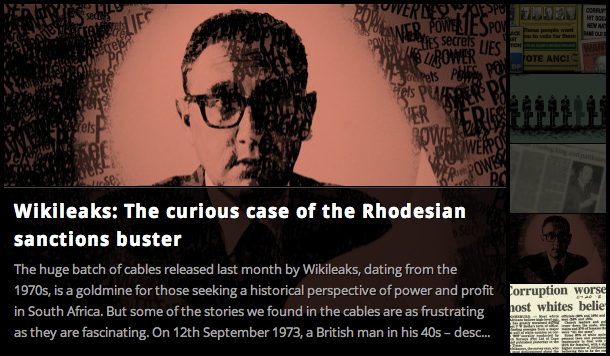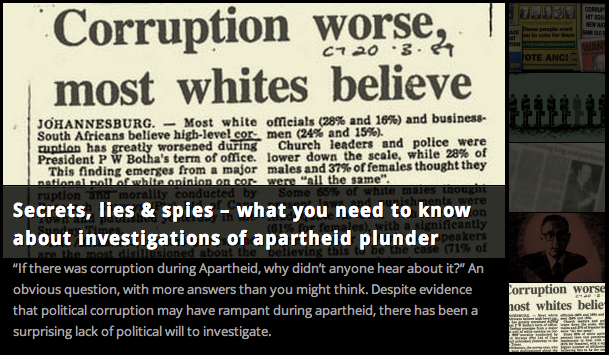Murray Hunter is a researcher on South Africa’s OpenSecrets project, which seeks to uncover and document corruption that has taken place during and since the Apartheid era. Here he talks about why it’s important to use a long lens when examining corruption and why unchecked historical corruption must be documented and analysed.
Ask any South African about corruption and they’ll tell you it’s a huge problem. From daily stories of petty bribery, to massive corporate collusions, to news that taxpayers are funding a $20-million upgrade to the President’s private home, corruption is a topic that dominates our news, our politics and our social lives. Much of the public perception of corruption centres on the apparent moral decline of the current ruling party, the African National Congress, which fought for liberation against the racist authoritarian system of apartheid to institute a constitutional democracy in 1994.
South Africans tend to look at corruption through the myopic lens of current affairs – to the extent that there is a common perception that corruption has spiked since the transition to democracy, and that the apartheid system may have been brutal in its methods, but at least it was ‘honest’ in its finances.

Image taken from the Open Secrets website
However, our culture of corruption goes back much further than public memory currently acknowledges. There’s reason to believe that grand corruption was rampant under the authoritarian apartheid regime, and corrupt practices thrived during the period of political instability from the late 1970s through to the country’s first democratic election in 1994. (See for example this 2006 study.)
This corruption would have been the result of conditions that are common for brutal regimes – international isolation coupled with domestic instability and massive levels of secrecy. These are in fact the perfect conditions for corruption.
In South Africa’s case, while the apartheid regime was waging a war against its people, its agents turned to economic crime to bust sanctions, buy favours abroad, and fund their dirty-tricks campaigns at home. At the same time, these activities were creating criminal networks between the state and the private sector, creating an opportunity for a small group of people to use the cloak of secrecy to steal vast amounts of money and move it overseas before the regime lost power.
It wouldn’t be unusual, in any regime in the world, for there to be pilfering among the political elite as their grasp on power begins to slip. When the party’s coming to an end, everyone makes one last pass at the buffet.
Yet, societies that have just gone through a transition seldom focus on the economic crime that went on under the last system. While human rights abuses like detentions, torture or state-sanctioned murder will often be aired through tribunals or truth commissions (in however limited form), newly democratic societies seldom want to ask hard questions about what their predecessors did with the money. (And certainly, international ‘experts’ advise against doing so). But if you don’t dismantle the corrupt networks that thrived under the past regime, they linger – and eventually, swallow up or co-opt the new elite as well.
But if all this is a common occurrence – either in South Africa or in any other society going through transition – it has hardly been explored.
So why do researchers, journalists and even fellow corruption activists sometimes go blank when you talk about investigating the history of corruption?
Cynics might ask: why focus on the past when things are so much worse now? Aside from the obvious response – how can you know that things are so much worse now until you have studied the past? – there are a few important motivations.
The first is a simple matter of restorative justice: if money was stolen, it should be brought back. The second is about collective memory: the failure to recognise the ‘long tail’ of systemic corruption leads to a distorted picture of both our past and present.
Equally importantly, in the era of open data and digital research, analysts and activists now have unprecedented access to data and vast new tools and technologies that can help uncover relationships and patterns that would have been hard or impossible to previously identify. As historical data slowly become liberated – whether it’s from a server somewhere or from a musty paper archive – we are better equipped than ever to study how power and profit have interacted through the decades.
But most importantly, it is only through understanding how one system of corruption gives way to another – looking at trends, differences and continuities – that we really get a feel for the true nature of corruption.
And it doesn’t only matter to us: the question of how deal with corrupted elites at the time of transition isn’t unique to South Africa. Societies in Latin America, West Africa, South Asia have all experienced similar disappointments. (Always funded, it seems, by the same ‘generous benefactors’ in the United States and Europe). Right now in North Africa, the Middle East and elsewhere, activists are putting their lives on the line to push out repressive kleptocratic regimes, to make way for governments that are open and responsive – just as in South Africa leading up to 1994. Perhaps then the South African experience can provide a lesson: corruption is like a cancer that will return if you don’t cut it out. One elite replaces another and the money stays the same.

Image taken from the Open Secrets website
Murray Hunter (@muzhunter) is a campaigner for the Right2Know campaign in South Africa (@r2kcampaign) and a researcher for the Open Secrets project, researching the roots of power and profit in South Africa project (@opensecretsZA).
Additional Resources:
- Project website for Open Secrets: Researching the Roots of Power and Profit in South Africa project.
